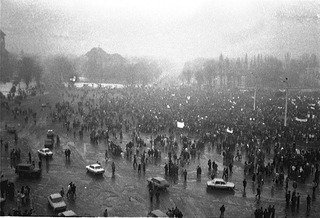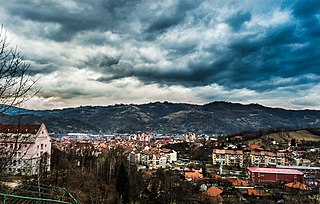
Uricani is a town in the Jiu Valley region of Hunedoara County, in southern Transylvania, Romania. As of 2021 it had a population of 6,669.

The mineriads were a series of protests and often violent altercations by Jiu Valley miners in Bucharest during the 1990s, particularly 1990–91. The term "mineriad" is also used to refer to the most significant and violent of these encounters, which occurred June 13–15, 1990. During the 1990s, the Jiu Valley miners played a visible role in Romanian politics, and their protests reflected inter-political and societal struggles after the Romanian Revolution.

Petroșani is a city in Hunedoara County, Transylvania, Romania, with a population of 31,044 as of 2021. The city has been associated with mining since the 19th century.

Lupeni is a mining city in the Jiu Valley in Hunedoara County, Romania, in the historical region of Transylvania. It is one of the oldest and largest cities in the Jiu Valley. It is located on the banks of the Western Jiu River within the Jiu Valley, at a height varying between 630 metres (2,070 ft) and 760 metres (2,490 ft). The distance from Lupeni to Petroșani is 18 kilometres (11 mi) on the DN66A road, and to Deva it is 114 km (71 mi).

The Jiu Valley is a region in southwestern Transylvania, Romania, in Hunedoara county, situated in a valley of the Jiu River between the Retezat Mountains and the Parâng Mountains. The region was heavily industrialised and the main activity was coal mining, but due to low efficiency, most of the mines were closed down in the years following the collapse of Communism in Romania. For a long time the place was called Romania's biggest coalfield.

Miron Cozma is a former Romanian labor-union organizer and politician, and leader of Romania's Jiu Valley coal miners' union. He is best known for his leading the miners of the Jiu Valley during the September 1991 Mineriad which overthrew the reformist Petre Roman government. Cozma was a controversial character in the 1990s, both within and outside of Jiu Valley.

Clubul Sportiv Municipal Jiul Petroșani, commonly known as Jiul Petroșani, simply as Jiul, is a professional football club based in Petroșani, Hunedoara County, founded in 1919 under the name of CAM Petroșani. Jiul Petroșani is one of the oldest active clubs in Romania. Founded before teams such as Steaua București, Dinamo București or Rapid București, Jiul, at its best, was ranked 2nd (1924–25) in the top-flight. For most of its existence, Jiul has been a constant presence in the first two tiers of the Romanian football league system, making it a traditional club in the country. In 1990, the closure of the Jiu Valley mines, the main engine of the local economy, led to the decay of Jiul, annually putting the team in danger of bankruptcy.
The June 1990 Mineriad was the suppression of anti-National Salvation Front (FSN) rioting in Bucharest, Romania by the physical intervention of groups of industrial workers as well as coal miners from the Jiu Valley, brought to Bucharest by the government to counter the rising violence of the protesters. This event occurred several weeks after the FSN achieved a landslide victory in the May 1990 general election, the first elections after the fall of the communist regime of Nicolae Ceaușescu. Many of the miners, factory workers, and other anti-protester groups, fought with the protesters and bystanders. The violence resulted in some deaths and many injuries on both sides of the confrontations. Official figures listed seven fatalities and hundreds of injured, although media estimates of the number killed and injured varied widely and were often much higher.

The Lupeni strike of 1929 took place on 5 and 6 August 1929 in the mining town of Lupeni, in the Jiu Valley of Transylvania, Romania.

The Jiu Valley miners' strike of 1977 was the largest protest movement against the Communist regime in Romania before its final days. It took place 1–3 August 1977 and was centered in the coal mining town of Lupeni, in Transylvania's Jiu Valley.
Lonea Coal Mine is an underground mining exploitation, one of the largest in Romania located in Petrila, one of six cities in the Jiu Valley region of Hunedoara County. The legal entity managing the Lonea mine is the National Hard Coal Company which was set up in 1998. The mine has reserves of 22.7 million tonnes of coal.
Uricani Coal Mine is an underground mining operation, one of the largest in Romania located in Uricani, one of six cities in the Jiu Valley region of Hunedoara County. The legal entity managing the Uricani mine is the National Hard Coal Company which was set up in 1998. The mine has reserves of 39.3 million tonnes of coal. After several fatal accidents and Romania's obligation regarding the reduction of the arrears of the CNH, the mine has been in the process of shutting down its operation since 2009.
Paroșeni Coal Mine is an underground mining exploitation, one of the largest in Romania located in Vulcan, one of six cities in the Jiu Valley region of Hunedoara County. The legal entity managing the Paroșeni mine is the National Hard Coal Company which was set up in 1998. The mine has reserves of 23.7 million tonnes of coal.
Livezeni Coal Mine is an underground mining exploitation, one of the largest in Romania located in Petroşani, one of six cities in the Jiu Valley region of Hunedoara County. The legal entity managing the Livezeni mine is the National Hard Coal Company which was set up in 1998. The mine has reserves of 22.6 million tonnes of coal.
Petrila Coal Mine is an underground mining exploitation, one of the largest in Romania located in Petrila, one of six cities in the Jiu Valley region of Hunedoara County. The legal entity managing the Petrila mine is the National Hard Coal Company which was set up in 1998. The mine has reserves of 16.5 million tonnes of coal.
Vulcan Coal Mine is an underground mining exploitation, one of the largest in Romania located in Vulcan, one of six cities in the Jiu Valley region of Hunedoara County. The legal entity managing the Vulcan mine is the National Hard Coal Company which was set up in 1998. The mine has reserves of 23.5 million tonnes of coal.
Bărbăteni Coal Mine is an underground mining exploitation, one of the largest in Romania located in Lupeni, one of six cities in the Jiu Valley region of Hunedoara County. The legal entity managing the Bărbăteni mine is the National Hard Coal Company which was set up in 1998. The mine has reserves of 27.9 million tonnes of coal.
Țebea Coal Mine is an underground mining exploitation, one of the largest in Romania located in Baia de Criş, Hunedoara County. The legal entity managing the Țebea mine is the National Hard Coal Company, which was set up in 1998. The mine has reserves of 14.7 million tonnes of coal.
September 1991 Mineriad was a political action and physical confrontation between the miners of the Jiu Valley and the Romanian authorities, that led to the resignation of Prime Minister Petre Roman's government. Led by Miron Cozma, president of the Jiu Valley Coal Miners Union, the miners engaged in a series of actions beginning in the 1990s referred to as "mineriads" whereby large numbers of miners traveled to the Romanian capital of Bucharest and engaged in demonstrations and sometimes violent confrontations against counter-demonstrators and government authorities.
This is a list of 1999 events that occurred in Romania.